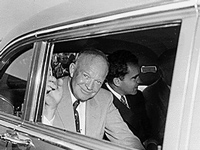| |
Why was Eisenhower so enormously popular? He emerged from World War II as the military man with the most political appeal, not because he was the greatest American general of the war or even the most famous, but because of his personality. There were other generals who had performed with at least equal brilliance and effectiveness and who reaped much smaller political benefits. These included Omar Bradley, George C. Marshall, Douglas MacArthur, and George Patton. Patton died in 1944 but he seems even less likely than the others to have been a successful politician had he lived. None of them had Eisenhower's personal qualities—his public warmth and friendliness, even though in private he was considered a rather cold man; his dazzling, highly photogenic smile, which became his political trademark; his comforting, unthreatening public image, which stood in marked contrast to, for example, the image of Douglas MacArthur, an impressively imperious man but not a very likeable one.
 |
General Dwight D. Eisenhower, the Republican nominee for president, in a limousine at Washington National Airport with his running mate, Senator Richard M. Nixon of California (September 10, 1952).
Image from video: HST-AVC: Audiovisual Collection (c. 1850c.—1990), Harry S. Truman Library, Independence, Mo. [NLT-AVC-PHT-(73)3915]
|
|
 |
 |
| President Eisenhower and Vice President Richard Nixon fish during photo opportunity in Colorado. |
 |
|  |
|
|
|
| |
Eisenhower was certainly not a television president, but he was a media president, one who owed much of his political success to his attractive personal image. Eisenhower was appealing in 1953—and throughout most of his successful, if not particularly eventful presidency—because he was so unthreatening. He seemed to embody the stability and the desire for unity that characterized so much of American life and culture in the 1950s. Eisenhower's approach to leadership was based, I would argue, on two fairly simple assumptions. First, he had a deep aversion to conflict and confrontation. He leaned instinctively toward consensus and conciliation. He tried to avoid doing anything that would disrupt what he considered the basic stability that prevailed in American society. Second, he was deeply committed to capitalism and to capitalists. He was a champion of free enterprise, a cheerleader for the business community in the hour of its great economic triumph. Eisenhower's presidency was, in short, an embodiment of the middle-class yearning for stability and unity.
|
|